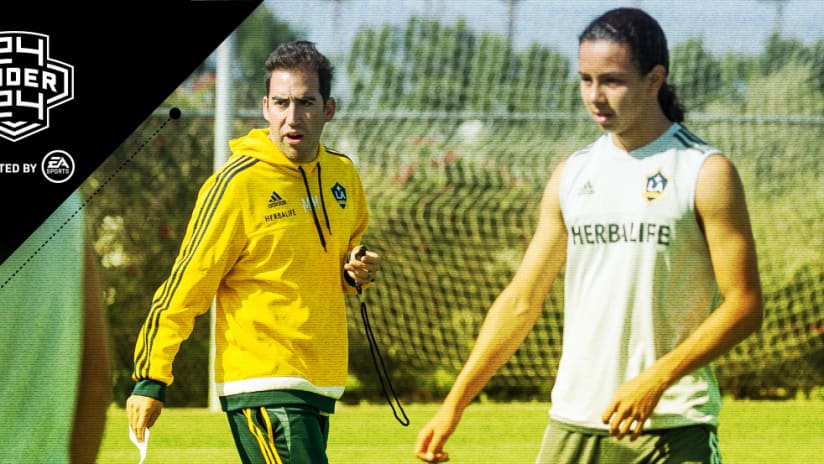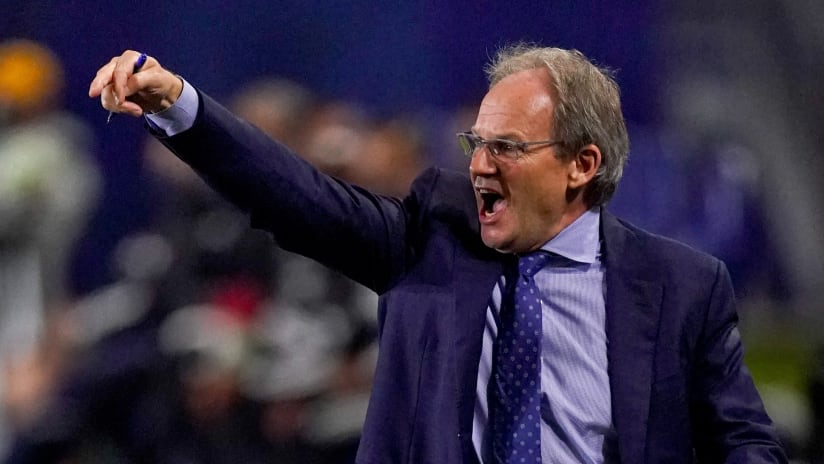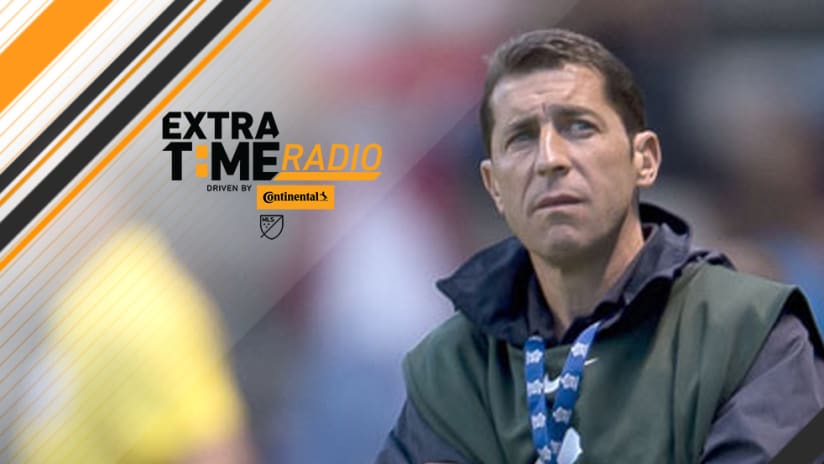At 12 years old, Mike Muñoz was a self-admitted “chubby kid” whose primary soccer coach was his dad. He didn’t know much about nutrition and was still a year away from joining a club team. Sure, his dream was to play professionally – but he knew of no clear way for that to happen.
Sixteen years later, Muñoz can only laugh. Now the LA Galaxy’s Under-18 head coach, Muñoz oversaw his academy’s inaugural Under-12 game vs. new rival LAFC earlier this month. That came about a year after it was first announced that the US Soccer Development Academy (USSDA), in a bold initiative aimed at further bolstering the sport’s long-term growth, would expand to include the U-12 age group.
And the game was complete with a packed sidelines, supporters with drums, and, yes – a lot of very excited 12-year-olds.
“It was a proper derby game already,” Muñoz told MLSsoccer.com. “The intensity was very high. The kids were getting after it. And the soccer was good.
“What kids have these days,” he added, “is truly unique and special.”
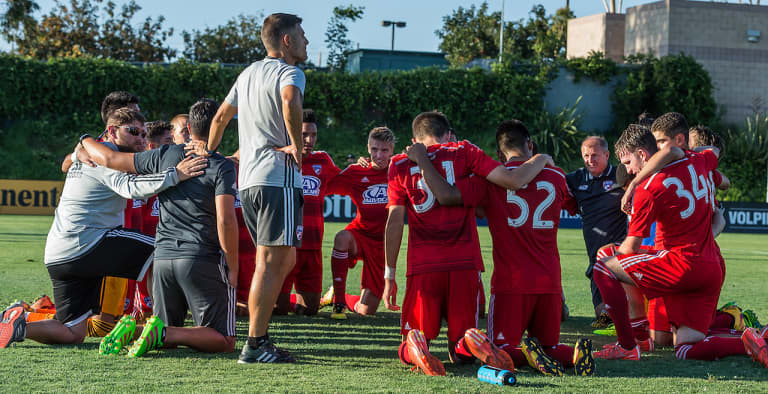
Luchi Gonzalez (standing), oversees FC Dallas' vaunted academy, which extends down to the U-7 level.
Luchi Gonzalez, FC Dallas’ academy director, could not agree more. Both Muñoz and Gonzalez played in MLS, but agree they probably could have had longer careers with proper training from a younger age.
Adding an official nationwide U-12 age group – the youngest yet – to US Soccer’s already-growing academy structure is certainly a step in the right direction, filling in an important gap in the developmental ladder.
“I can only imagine if I had more frequency on the ball and more exposure to high-level competition and maybe a pathway to a pro team at a young age, I think I could have made a bigger impact in the professional game,” said Gonzalez, who made eight appearances with the San Jose Earthquakes in 2002, and 22 with the Colorado Rapids from 2005-06. “That’s what this is all about – learning from our experiences and making the ones our kids are going through better.”
Few teams have embraced youth development more completely than FC Dallas, who already have kids in their program all the way down to the U-7 level, fielding multiple U-12 premier teams for almost a decade.
But now that their U-12s fall under the umbrella of US Soccer, Gonzalez is eager for the better competition against other MLS academy teams as well as the increased exposure from international tournaments. The U-12s now train three times a week instead of two, which he thinks is another significant change.
“We believe in a long-term pathway starting at the bottom,” Gonzalez said. “The younger we can have a player in our culture, we feel the higher chance they have to play in our stadium. Now that U-12 is mandated by US Soccer, it allows us as a club to really focus on the age group.”
Gonzalez admitted the club is fortunate to have a big talent pool to choose from in the Dallas club youth scene. Still, selecting an academy team is never an exact science – for FC Dallas or any of the other 133 clubs at the U-12 level that began play in the 2016-17 US Soccer Development Academy season.
For the Galaxy, Muñoz said LA built their U-12 program from scratch starting about six months ago, focusing on hiring the right coaches and scouting players using different factors than they might use for older age groups (athleticism, for example, doesn't loom as large).
The Philadelphia Union also spent careful time with what academy director Tommy Wilson called “targeted scouting,” with coaches going to “hundreds and hundreds of games” around the area while continuing to keep tabs on even players they didn’t bring into the fold. And while admitting that “we don’t have a crystal ball, so it’s hard to identify who the right ones are,” Wilson is pleased with what he’s seen as the USSDA season kicks off.
“Our 12s are just as bit of a talented group as I’ve seen,” he said. “And I’m really excited about seeing them develop.”
Wilson is quick to acknowledge that it’s a different beast when players are perhaps a decade away from playing for the Union or the franchise’s USL affiliate, Bethlehem Steel FC. While things are often quite cutthroat at the U-18 level, where players could be just one step away from turning pro, “with the young ones you portion time more evenly,” he said. And although the tactics and expectations are similar, the U-12 coaches have to maintain a different approach in training sessions, too.
“You’re a little bit softer with them, a little bit more lenient and a bit more understanding,” Wilson said. “But there’s more to be taught at that age. And they’re sponges; they soak things up.”
On a similar note, Wilson is glad that there are no official standings recorded for the USSDA U-12 games, which are played 9 to a side, with 30-minute halves.
“The games are still competitive; they’re just trophy free,” said Wilson, who worked in player development for Rangers FC before being hired by the Union in 2013. “I’ve been through that in Scotland, and I think that’s the right way to go.”
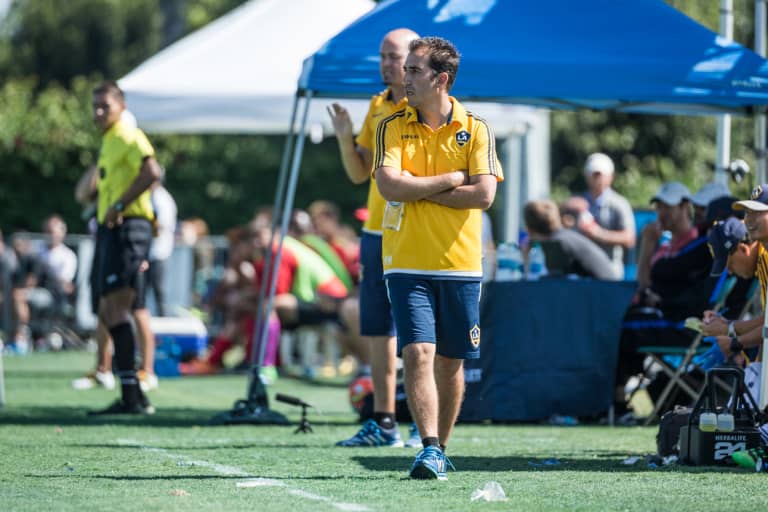
Mike Muñoz paces the sideline during LA Galaxy academy training.
To be clear, winning still matters – a fact that Muñoz said would have been obvious for anyone attending the two recent LA Galaxy-LAFC U-12 games. And while he agrees that you have to be careful how you talk to young kids on the field, he also said that “a little bit of tough love” can be required at times to help instill the lessons of what it takes to be a pro – which, of course remains, the ultimate objective for MLS academies.
“I think winning is a part of player development,” Muñoz said. “At the Galaxy, we have a strong history of a winning culture from the first team down. That’s something we want our kids to identify with. But I say that very delicately because the most important thing for kids this age is to build a foundation in the game of soccer and become masters of the principal of the game. A lot of times you can lose that if you’re solely focused on winning.”
For Muñoz, the most important things 12-year-old players can learn are technique and coordination because by the time they hit their later teenage years, it may be too late. Many of the other lessons revolve around soaking in the franchise’s culture, which they hope is identical from the oldest stars on the first team to the youngest kids in the academy.
“Obviously the earlier you can add age groups to your academy, the better it is to begin forging an identity,” Muñoz said. “It’s always harder to bring kids in at older ages to try to play catch up. You really want to limit that.
“We’re already playing catch up with the rest of the world, but this is a big step in the right direction.”
Gonzalez pointed to highly competitive youth games in Argentina as one example of what the US could strive to reach – and US Soccer’s new Under-12 academy program might just help them get there.
“We’re not competing with just the other clubs in Dallas or California or Ohio,” Gonzalez said. “We’re competing globally.”

